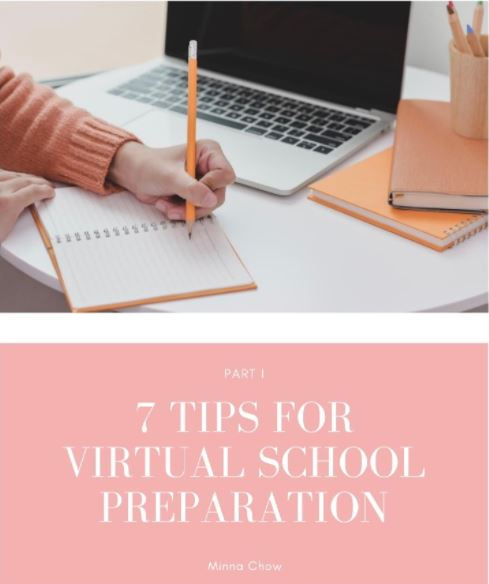Seven Tips for Virtual School Preparation (Part One)
- Strawberry Opportunities

- Nov 2, 2020
- 6 min read
Written by Minna Chow
Edited by Christina Linsley & Lucia Koo

“New normal,” “Unprecedented time,” “A story for the grandchildren…”
No matter how you’ve heard about it, the truth remains that the COVID-19 pandemic is as much a story of the day-to-day as it is a story of doctors and vaccines. It’s a story of masks, hand sanitizer, and virtual school for a lot of students.
Although many of us ended our school year at home, learning a whole new curriculum from the computer screen can be another beast entirely.
Fortunately, dragons can be slain!
Here are seven tips to help you prepare you for your first day of virtual classes. This first part will cover ways to promote your academic success.
1. Create a Designated Workspace (That Isn’t Your Bed)
One of my favorite Youtubers, CGP Grey, made a wonderful and non-judgmental video about staying healthy and productive during the quarantine.
In this video, he stressed the importance of maintaining separate spaces for different activities: having one place for sleeping, another where you eat, or watch Netflix. Granted, watching Netflix in bed or bringing a snack with you to your work-desk isn’t the end of the world. However, creating designated areas for working can indeed be extremely helpful for productivity.
Doing this may sound difficult, to say the least, but creating a workspace doesn’t have to be intensive at all! Ideally, you would have a separate room for learning, but that isn’t required. You could designate a corner of your room as a school area or set up a temporary station at your dining table. Try to keep this area as quiet and well-lit as you can; it needs to be a place you can sit and work comfortably for a few hours.
Creating a workspace helps you mark a separation between school and home, preventing school and schoolwork from invading your life. Having just one area to go to each day results in creating a much-needed sense of normalcy. By creating a workspace, you’re changing your environment for the better and giving yourself the best chance for success on your own terms. It’s also just plain satisfying!
2. Learn About and Take Note of any Logistical Concerns
Ah yes, the virtues of thinking ahead—haven’t we all heard of this before? I’m not going to ask you to plan your life out;—sometimes, you have to wing it. That being said, there are a few quick points you can figure out before classes start, which will go a long way to making the entire situation less stressful.
What’s your schedule going to be like? When do you need to wake up? When do you need to log on to class? I would recommend being ready to go anywhere between 10 to 15 minutes before class starts, just if your computer decides to buffer or crash.
When are you going to eat? How much time do you have? Is it enough to make lunch, or will you need to have it pre-made? Will you be able to eat during class? Attending virtual school on an empty stomach is the furthest thing from fun.
What devices might interfere with a class? Some electronics like blenders and microwaves can wreak havoc on your learning environment. It’s best to know ahead of time so you can try to work something out with your family.
What supplies will you need for virtual school? Most of these should be pretty similar to regular school, but your school may have additional requirements. Though not necessary, a headphone set with a microphone can go a long way in reducing distractions.
3. Try to Set a Routine and Keep To It
You’ll probably have to keep a routine because of your school schedule, but there are benefits to planning your day beyond that. Much like creating a workspace, setting a routine can help establish a sense of normalcy and control. It’ll help organize your day and empower you towards attending classes with confidence. Keeping yourself busy can also help take your mind off of the worry and anxiety that seem to be all too common these days.
The key to setting a routine you can follow is to create one that you don’t hate. Plan your work times, and give yourself some time to decompress and do your favorite activities. Don’t feel obligated to work just because you can constantly! It’s also okay if you plan something and wind up doing something else instead; it’s the structure that matters.
Keeping a routine can be pretty difficult when you’re at home with a million distractions and few incentives. It’s also pretty easy to forget about a Zoom meeting you’ve scheduled if you don’t have it written down somewhere (speaking from personal experience).
Here are some tips to make the process of following your schedule a little less arduous:
Set alarms. At school, bells help distinguish from class to class, but at home, you have alarms! For example, try setting one five minutes before you have to be in class. You can even label them to remind yourself what your phone’s beeping for.
Jot down appointments on a visible calendar. For example, a desk calendar or one hanging on your wall is perfect. You’re less likely to forget you have a Zoom meeting at eleven if you’re reminded every time you look up.
Use a planner. This one’s tried and true! Writing down your schedule and assignments will help you remember them. Plus, it saves you the mental effort of memorizing events, dates, etc.. This doesn’t have to be anything fancy. What works, works!
Note: Steps two and three are not static! As the days go by, you’ll discover new schedules that work for you, and new events will pop up, in which you’ll have to adjust (the spice of life, as they say) accordingly.
4. Take Advantage of Your Resources Early
The internet is a vast dimension with countless helpful videos and articles for any subject you can think of. Although they won’t replace one-on-one instruction or teacher interactions, you’d be surprised at how much is out there and how much of it can help you.
The key is to go looking ahead of time. Again, this doesn’t have to be arduous: a quick resource search can do wonders for your mental preparedness. (Storing too many resources can also be difficult to keep up with)
It’s also fun to go out and see what you can find; it’s like a scavenger hunt!
Online Resources by Subject
General: Google’s always a great place to start. YouTube is helpful; if there’s a class for it, there’s a YouTube video or playlist for it. If you’re feeling really ambitious, there are also some free college lectures online on a wide range of topics.
Math: Calculator apps are wonderful and can save you the trouble of buying or finding your own. I personally use Calculator X for my iPhone. Also, videos, where people explain how to solve problems or worked-out keys for problems similar to those you’re working on can be super helpful.
Science: PhET Labs can be a great visual resource for science classes; they have digital labs for everything from Simple Harmonic Motion to Beer’s Law.
History: Quizlet can be a great resource for those pesky memorization tests. For the more serious history nerds out there (or those who need to write a research paper), Google Scholar can be a great place to start your research. Furthermore, your school will often have access to digital databases, and it’s worth taking the time to see what they offer. (A lot of these resources also apply for English)
English: Behold! My favorite citation generator: https://www.citefast.com/?s=APA7. Purdue Owl’s series on how to format papers is also a wonderful resource.
Even if you never use the videos you’ve bookmarked or the articles you found, you now know they exist and where to find them—they’re in your toolbox.
Note: The beauty of the Internet is that it doesn’t hold just academic information. The Internet can also help you adjust to these changing times. Mental health articles, potential tutoring resources…the list is endless.
That’s part one of Seven Tips for Virtual School Prep! In our next article, we’ll be talking about ways to take care of yourself in the middle of virtual classes.

Minna Chow is a senior currently residing in the DFW area with a passion for the humanities and writing. She is excited to work with Strawberry Opportunities to help people make connections and achieve their goals. In her free time, Minna can be found playing the oboe, embroidering, or crocheting.






Commenti